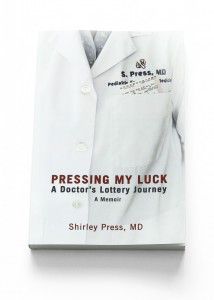Pressing My Luck: A Doctor’s Lottery Journey
 Kindle Edition
Author: Shirley Press, MD
Reviewed by: Anne Holmes for the NABBW
Kindle Edition
Author: Shirley Press, MD
Reviewed by: Anne Holmes for the NABBW
As this memoir opens in early September 2010, Dr. Shirley Press is a board-certified, pediatric emergency physician with 30 years of experience treating children with acute medical conditions. She is director of the Pediatric Emergency Department at Jackson Memorial Hospital and an Associate Professor of Clinical Pediatrics at the University of Miami, Miller School of Medicine.
A woman busy trying to balance patients, paperwork, her personal needs and the needs of her family, we learn that although she’d never won anything in her life, she did regularly play the Florida Lottery – especially when the jackpots were large. (After all, who doesn’t like to fantasize about how coming into a huge windfall might change our lives?)
So on September 5, 2001 with the odds of winning projected to be one in 20 million — she bought six Quick Pick tickets and a Peppermint Patty candy bar at the hospital gift shop, absent-mindedly tucked the tickets into her lab coat pocket and and moved on with her busy day.
Amazingly, one of Dr. Press’s six tickets WAS the winning ticket, and the day’s payout was $56 million. (Or as she quickly points out: $17.5 million take home.) Of course, winning precipitated many changes in Shirley’s life. Among them, she is no longer director of the Pedi-ER at Jackson Memorial, though she stayed on in that capacity for a year and still works there part-time.
But as we learn in reading this story, winning a lottery does not relieve anyone of experiencing life’s challenges. She write candidly about her son Gershon’s drug-addiction and her husband’s near-fatal illness.
We also read about her early life as the daughter of Holocaust survivors, and a college prank in which she and several friends broke into Paul McCartney’s London home. A born list maker, she even offers up a few of her favorite lists toward the end of the book.
This is a reflective tale, and not one you are likely to read anywhere else. Dr. Press tells us that one of the many benefits of winning has been that she now has time to devote to personal interests and causes, including writing. Something her hectic, full-time medical life did not allow.
Toward the end of the book, Shirley reveals that the lottery experience taught her that most of the confidence and personal growth she’s achieved post-win could have been achieved without all the money. If she had only made the time. This was a personal epiphany. And perhaps the most important lesson of the book.



Leave a Reply
You must be logged in to post a comment.